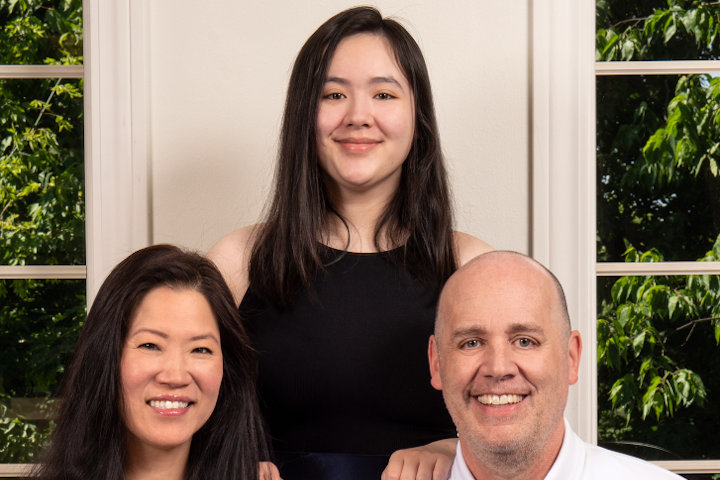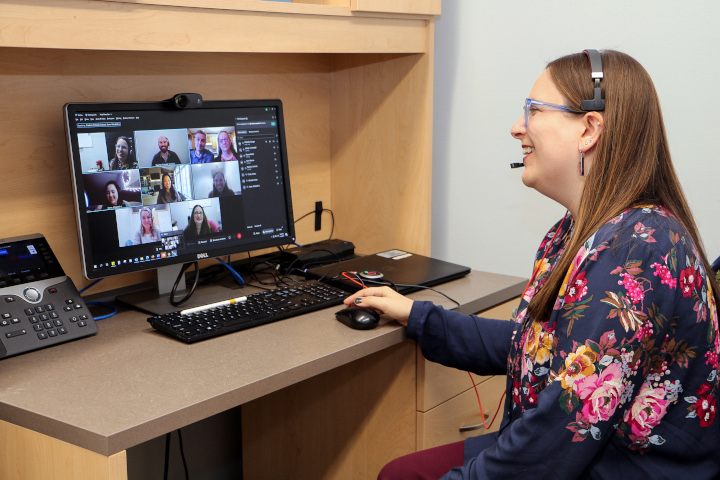Student-Run Podcast Highlights the Importance of Narrative Medicine
The podcast uses storytelling to gain a deep understanding of people's experiences and enhance empathetic, patient-centered care.
Elizabeth “Lizzie” Oster was 16 years old when she was diagnosed with autism.* Most autistic people are diagnosed young, typically between the ages of 4 and 5, according to the Centers for Disease Control and Prevention, and they can start therapy early. For Lizzie Oster, this wasn’t how it went.
It took years, a slew of misdiagnoses and many ineffectual therapists before the idea of autism was brought to the table. She endured visits with physicians who didn’t understand her, a brief inpatient hospital stay and nearly impossible communication with her parents. All of those years that she went without a diagnosis meant huge amounts of time lost when she and her family could have benefited from treatment.
For Lizzie Oster and her family, her autism diagnosis was a relief.
“It was really difficult before we had the diagnosis,” says her dad, Rick Oster.
A diagnosis meant they could begin to understand how Lizzie Oster’s brain works, learn from therapy with autism specialists and finally figure out how to communicate and support one another. This long, difficult journey then brought the Oster family to the Waisman Center in Madison, Wisconsin, with the hope that the center’s Autism Treatment Programs would be a good fit for Lizzie Oster. The program is headed by Molly Murphy, PhD, BCBA-D, a behavioral analyst and clinical adjunct professor in the University of Wisconsin School of Medicine and Public Health’s Department of Pediatrics.
“We had gone other places and hadn’t gotten good results,” Rick Oster shares, adding that at this point in their journey, their family needed a win.

The family began therapy with Madeline Barger, MS, LMFT, BCBA, CST, the Autism Treatment Programs’ lead behavior analyst. She is a Wisconsin-licensed behavior analyst, licensed marriage and family therapist, and an American Association of Sexuality Educators, Counselors and Therapists-certified sex therapist. Barger’s treatment style immediately resonated with the Oster family.
“The difference we noticed immediately was the Waisman Center takes a more holistic family approach,” says Michelle Oster, Lizzie Oster’s mom. “With many of the previous therapies, we would have no idea what they were working with Lizzie on or what we could do to support her. Madeline Barger and the Waisman Center really taught Rick and me about our family, how best we could support Lizzie, and how we could understand her, too.”
The Oster family credits Barger and the Waisman Center with saving their family.
“Our one-on-one sessions [with Madeline Barger] changed our whole family and our lives,” notes Rick Oster.
With Lizzie Oster now in college and beginning the challenges of transitioning into adult life, Barger thought she would benefit from the newly constructed autistic adult treatment series developed at the Waisman Center to provide education and support around the skills needed to transition into adulthood. As the lead provider for teens and adults in the Waisman Autism Treatment Programs, Barger launched this unique group-treatment series to help fill a gap in treatment for older autistic people.
“The reason we started with adults is based on a high community demand and clinical need. This 2021 group is specifically an adult women’s group because autistic women often report later-in-life diagnoses,” explains Barger. “Late diagnoses tend to lead to less-effective treatment interventions, and [the women] often come to us with pretty intense trauma histories prior to their autism diagnosis.”
She continues, “We want to take steps to support autistic adults with access to appropriate, autism-informed health care, which is lacking in the community.”
Lizzie Oster experienced firsthand this gap in autism treatment for young adults who were diagnosed late. Prior to coming to the Waisman Center, she had seen an autism specialist but found that provider unhelpful because the program was designed for autistic children.
“She showed me resources to teach autistic people, but it was really designed for autistic children,” Lizzie Oster says. “It was horrible and kind of infantilizing, as well.”
The year-long, young-adult group-therapy series is split into three curriculums, each designed to address an important challenge of experiencing adulthood. The first is Transitioning Together, a psycho-education model focused on adult transition. The program was developed at the Waisman Center by Leann DaWalt, PhD, a senior scientist, Waisman investigator and director of the center’s University Center for Excellence in Developmental Disabilities. Transitioning Together is based on more than 20 years of longitudinal research.
The second is a customized group version of the University of California, Los Angeles (UCLA) PEERS® (Program for the Education and Enrichment of Relational Skills) program. And the important and unique third trimester, called Advanced Adult Relationships, was designed by Barger, who has rare, specialized training that allows her to provide systemic sexuality education and treatment for autistic people. This educational program allows group participants to meet their individual adult relationship goals toward dating, intimacy, partnering and general sexuality. According to Barger, this is the only program of its kind in the United States.

Transitioning Together builds the basis for fostering self-efficacy, social engagement and problem-solving. The UCLA PEERS® program delves into necessary social skills, such as initiating conversations and building and maintaining friendships. Advanced Adult Relationships is best delivered after the initial foundation of social relationships is built, and it targets skills needed to foster healthy adult relationships. Each of these programs is successfully run by itself, but together, they form the year-long treatment series offered at the Waisman Center. And as Barger works with the young adults, Alyssa Walsh, PhD, and Sara Warner, PsyD, both licensed psychologists, run a concurrent group to teach parents the best ways to support their young adults.
“For Transitioning Together, the goal of the parent group is to reduce family stress, build a sense of community and engage in family problem-solving in a group context,” Walsh says. “Then, within the PEERS® program and the Advanced Adult Relationships curriculum, the goal is to talk about the same type of social skills that Madeline Barger is discussing with the young adults, so parents can support them in those areas.”
The Oster family says they have reaped enormous benefits from the autism group-therapy program, with one of the biggest being a sense of belonging and community.
“I think it’s cool because I haven’t been able to meet a lot of other autistic people other than sort of at a glance, and never females,” says Lizzie Oster. “It’s been really nice for me to meet some other autistic girls and see how they interact because I feel like sometimes watching someone else, you can recognize your behaviors in them.”
Rick and Michelle Oster say there is a peace in talking with other parents who understand the struggles of having an autistic child without them needing to explain it.
“We are learning from the other parents, as well. Having those shared resources and that forum to share, because all our girls are late-diagnosed and are high-functioning on the autism spectrum, it is really helpful,” Michelle Oster says. “Sometimes I am just too tired to explain, and I don’t have to do that with the parents in this group. They understand, and that’s a good feeling.”
Following this first year-long autism group-therapy series, Barger and Walsh are excited by the results. Their unique combination of licensures, which allow them to provide both psychotherapy and behavioral therapy, is unusual in the autism-treatment world. But they have found that being able to provide both services in a group setting uniquely benefits their patients.
“So far, our group members are reporting decreased anxiety levels, and they’re increasing their targeted participation goals. They’re talking more and sharing more,” Barger says. “They report excitement at the possibility of cultivating new social skills toward creating and maintaining friendships and more intimate relationships. They’re all really invested in this.”
Barger and Walsh have big plans for the autism group-therapy program. They want to build a larger, more robust training program around the group-therapy series to cultivate more clinicians who can provide this type of care. Holding the combination of licensures needed to do it, they know the unique construction of their programming offers something special, and they want to make it available for more autistic young adults who could benefit from it.
“At the moment, we are small in number at the Waisman Center’s Autism Treatment Programs specific to serving adults. But we are mighty in drive, experience and clinical skill,” Barger says. “We hope, over time, to have more staff so we can build something bigger.”
For now, though, the group-therapy series is more than the Oster family could have hoped for.
“I don’t know what we would do without this young-adult transition program,” Michelle Oster says. “I kind of feel like you either get in somewhere early or you’re like Lizzie. We’re so grateful that we could be a part of this program.”
*Lizzie Oster feels strongly about being referred to as an autistic person rather than a person with autism. The language in this piece reflects that preference.